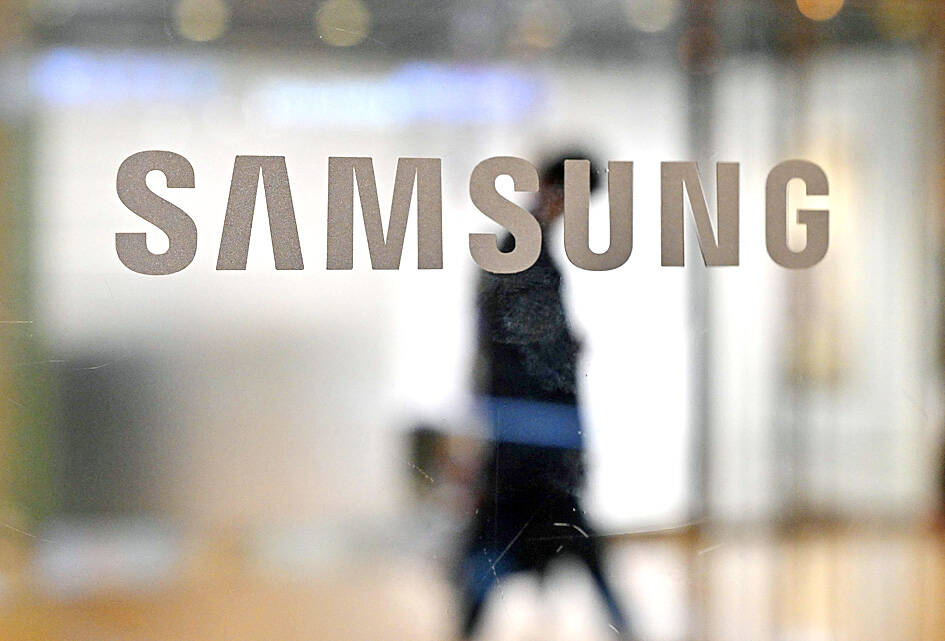Samsung Electronics Co is to build a new semiconductor chip development facility in Japan, Japan’s Nihon Keizai Shimbun reported.
The plant would be in Yokohama, where Samsung has a research and development site, the report said, without citing anyone.
The South Korean firm would build a production line for a prototype chip, and the facility would cost more than ¥30 billion (US$221 million), with the Japanese government expected to provide more than ¥10 billion in subsidies, it said.

Photo: AFP
Operations are targeted to begin in 2025, it reported.
Samsung’s move follows its bigger foundry rival Taiwan Semiconductor Manufacturing Co (TSMC, 台積電), which is building a plant in Japan’s Kumamoto Prefecture for its 12-nanometer, 16-nanometer and 22-nanometer processes, as well as 28-nanometer specialty technology, with commercial production expected to start next year.
TSMC is building the plant through Japan Advanced Semiconductor Manufacturing Inc, a joint venture with Sony Semiconductor Solution Corp and Denso Corp.
Relations between Japan and South Korea are improving, with their leaders visiting each other’s nations and agreeing to cooperate on chips and security.
The Japanese government has also been signaling support for semiconductor and battery projects as it tries to bolster its supply chain for the key products. Japan would provide subsidies for eight battery and two semiconductor projects, Japanese Minister of Economy, Trade and Industry Yasutoshi Nishimura said last month.
Separately, Samsung executive chairman Jay Y. Lee and Tesla Inc chief executive officer Elon Musk met in the US last week, South Korea’s Yonhap news agency reported.
Lee and Musk held the meeting at Samsung’s semiconductor research center in Silicon Valley, California, on Wednesday, Yonhap said yesterday.
The two companies are looking at possibly joining forces to develop chips for fully autonomous vehicles among other things, the report cited people in the industry as saying.
The global market for automotive chips is expected to rise to US$400 billion by next year, and to jump to US$700 billion by 2028, Yonhap said, citing Strategic Analytics and Research and Markets.
Lee wrapped up his 22-day visit to the US on Friday, after a series of meetings with other business leaders including Microsoft Corp CEO Satya Nadella and Google CEO Sundar Pichai, the report said.
The meeting was Lee’s first private one with Musk, Yonhap said.
Additional reporting by CNA

Taiwan Semiconductor Manufacturing Co (TSMC, 台積電) would not produce its most advanced technologies in the US next year, Minister of Economic Affairs J.W. Kuo (郭智輝) said yesterday. Kuo made the comment during an appearance at the legislature, hours after the chipmaker announced that it would invest an additional US$100 billion to expand its manufacturing operations in the US. Asked by Taiwan People’s Party Legislator-at-large Chang Chi-kai (張啟楷) if TSMC would allow its most advanced technologies, the yet-to-be-released 2-nanometer and 1.6-nanometer processes, to go to the US in the near term, Kuo denied it. TSMC recently opened its first US factory, which produces 4-nanometer

GREAT SUCCESS: Republican Senator Todd Young expressed surprise at Trump’s comments and said he expects the administration to keep the program running US lawmakers who helped secure billions of dollars in subsidies for domestic semiconductor manufacturing rejected US President Donald Trump’s call to revoke the 2022 CHIPS and Science Act, signaling that any repeal effort in the US Congress would fall short. US Senate Minority Leader Chuck Schumer, who negotiated the law, on Wednesday said that Trump’s demand would fail, while a top Republican proponent, US Senator Todd Young, expressed surprise at the president’s comments and said he expects the administration to keep the program running. The CHIPS Act is “essential for America leading the world in tech, leading the world in AI [artificial

REACTIONS: While most analysts were positive about TSMC’s investment, one said the US expansion could disrupt the company’s supply-demand balance Taiwan Semiconductor Manufacturing Co’s (TSMC, 台積電) new US$100 billion investment in the US would exert a positive effect on the chipmaker’s revenue in the medium term on the back of booming artificial intelligence (AI) chip demand from US chip designers, an International Data Corp (IDC) analyst said yesterday. “This is good for TSMC in terms of business expansion, as its major clients for advanced chips are US chip designers,” IDC senior semiconductor research manager Galen Zeng (曾冠瑋) said by telephone yesterday. “Besides, those US companies all consider supply chain resilience a business imperative,” Zeng said. That meant local supply would

Servers that might contain artificial intelligence (AI)-powering Nvidia Corp chips shipped from the US to Singapore ended up in Malaysia, but their actual final destination remains a mystery, Singaporean Minister for Home Affairs and Law K Shanmugam said yesterday. The US is cracking down on exports of advanced semiconductors to China, seeking to retain a competitive edge over the technology. However, Bloomberg News reported in late January that US officials were probing whether Chinese AI firm DeepSeek (深度求索) bought advanced Nvidia semiconductors through third parties in Singapore, skirting Washington’s restrictions. Shanmugam said the route of the chips emerged in the course of an